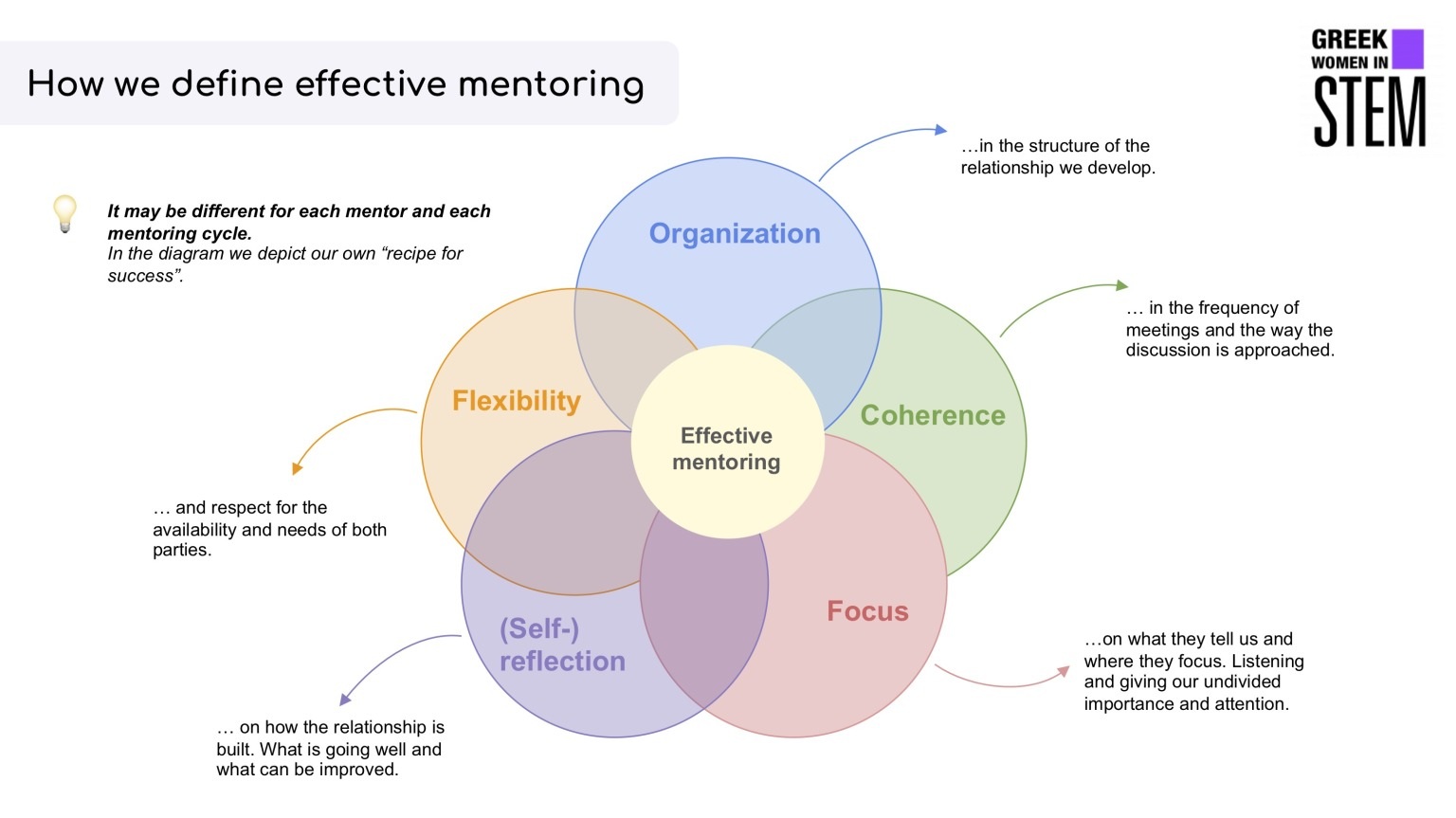
Prof. Athena Vakali: Shaping human-centered AI and inclusivity in STEM
Thaleia-Dimitra Doudali

A couple of weeks ago, our monthly Greek Women in STEM social event was dedicated to tools for mentoring. After the fruitful discussions we had, and in an attempt to build on our previous article, 5 tools to increase your productivity about planning and productivity, we thought to openly share what helps us to build effective mentoring relationships with our mentees.
Let's start with how we define effective mentoring. We believe it is a patchwork of interconnected and necessary characteristics to be adopted both by mentors and mentees during a mentoring cycle. These features are (see also diagram below):
For example, fixing our meetings at the same time each week can reduce the stress of scheduling each week, create the necessary stability and confidence, and bring more energy and attention to what really matters - building a strong relationship with our mentees.
Note that the above concerns the practical side of mentoring and not the essence and importance of mentoring, which we have talked about in other articles.

Tools like Apple Notes, Notion, Google Docs, and Microsoft ΟneNote help you keep track of what was discussed at each meeting. These are easily shareable, collaborative tools and offer flexibility. After all, it is important and beneficial to collect the information given to us in each meeting in order to pay attention to the issues that our mentees entrust to us. The above can also serve as a to-do list in case further steps and actions have been agreed upon.
However, our favourite tool, even here at the Greek Women in STEM team, is Trello, which is easy to use, provides the freedom to prioritise and label our actions and tasks, as well as to set deadlines for outsourcing. We often use the Kanban model in Trello: what to do, what we are doing now, and what we have done.
Tools like Google Jamboard and Miro serve as ideal collaborative tools for brainstorming and creating vision boards during a meeting. Tools like SimpleMind are used to organise our thoughts and discussions, especially for mentees who want to decide between many options. For example, many mentees seek guidance on what is involved in choosing a doctorate, what to look for in a job, and how to compare the two. A mind map might be a good choice to unpack these.
Calendly and Doodle can be used to create a consistent schedule of meetings during the mentoring cycle, as they help us to easily schedule appointments at commonly available times. For example, many mentors set aside free time at Calendly so that mentees can make direct appointments.
The SWOT analysis aims to identify strengths, weaknesses, opportunities, and threats (potential risks). It’s a popular method used in business project management. However, this analysis is often very useful for visualisation, awareness of opportunities and points of development, but also for setting goals and necessary actions for personal and professional development. You can use one of the aforementioned collaborative tools to capture your SWOT analysis and edit it interactively.
In conclusion, there are many tools that can make mentoring more efficient and creative, but their use and effectiveness depend on the discretion of each mentor and the needs of each mentee. This does not negate, of course, that there are times when all that is needed is a simple, meaningful discussion. Think of the above as some useful tools to have in your toolset as mentors, as an extension of your abilities, or as aces up your sleeve.
It would be great to know which of these tools you use and in what context, how you found them, if you used them for the first time, or other tools and methods that you find effective in mentoring. Contact us through our channels!
The article was authored by Tatiana Charikleia Styliari and Katerina Britzolaki.

Thaleia-Dimitra Doudali

Kiki Barmpa


Tatiana Charikleia Styliari